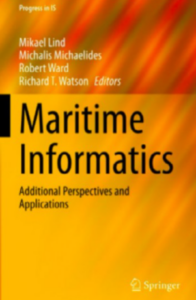It is known that shipping is the world’s oldest sharing economy and is conducted in a self-organizing manner. Namely, shipping is capital, energy, and information intensive, and with the growing impact of digitalization and climate change, there is a need to rethink the management and operations of this critical global industry – assisted in no small way by maritime informatics.
In light of the situation, the “Maritime Informatics” published by Springer, addresses some of the most recent practical developments and experiences, particularly from a global perspective.
 In fact, the purpose of this book is to provide further background and insights into the current status and future directions of maritime informatics from the perspective of recent practical experiences, looking at such things as the supply chain in support of global emergencies, recycling resources, and the circular economy, ports acting as multidimensional hubs, the tandardisation of data, and the emergence of data sharing platforms in the global container trade.
In fact, the purpose of this book is to provide further background and insights into the current status and future directions of maritime informatics from the perspective of recent practical experiences, looking at such things as the supply chain in support of global emergencies, recycling resources, and the circular economy, ports acting as multidimensional hubs, the tandardisation of data, and the emergence of data sharing platforms in the global container trade.
In addition, what makes this book a worth-read is that it marks contemporary movements in order to tackle global concerns, complementing in this way the original book on Maritime Informatics. As informed, the book contains six chapters on maritime technology and supply chain data exchange, which are the following:
- Responding to Humanitarian and Global Concerns with Digitally Enabled Supply Chain Visibility
- Digitalisation in a Maritime Circular Economy
- Ports as Multidimensional Hubs
- The IMO Reference Data Model: One Solution Fits Most!
- The Role of Industry-Based Standards Organisations in Digital Transformation
- Boosting the Effectiveness of Containerised Supply Chains: A Case Study of TradeLens
For the records, Maritime Informatics – Additional Perspectives and Applications aims to complement the ideas presented in the original Maritime Informatics book from last November. Overall, the book is all about enabling understanding, predicting, advising, and improving maritime activity by digital means.
As a result of the very positive feedback to our first book, we are now adding several additional and important foundational topics. The additional six chapters, like those in our first book, are intended to significantly advance knowledge of Maritime Informatics and send a strong signal to all in the industry that Maritime Informatics is a collaborative and much needed mechanism that will accelerate the digital transformation and efficiency of the industry.
…says Mikael Lind, Michalis Michaelides, Robert Ward, and Richard Watson.






























































